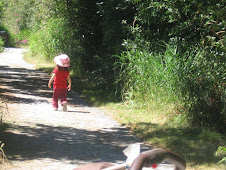Tuesday, October 4, 2011
Second Marriages and Stepchildren
But like most problems, there are things that can be done when you have stepchildren and still be able to enjoy a relatively cohesive second marriage. The first thing is to have understanding and to realize that anything worth having takes time and hard work. Also, realize that realistic expectations will be knowing that:
- a blended family will not be an instant, loving family;
- the stepchildren will not automatically love you;
- they will not necessarily respect and obey you;
- may not be fair in their treatment of you;
- they will probably not think and behave like adults;
- the children's biological parent will not always agree with your point of view;
- the biological parent may not think you are being as fair with their children as your own;
- there is likely to be problems with non-custodial biological parents around holiday time, special events and school activities;
- you may have to live up to the memories of a deceased parent or spouse;
- the biological parent may not believe the step-parent is as affectionate with their children as they should be;
- you or your spouse may have feelings of being left out, feeling jealous or possibly resentful of your partner's children, possibly even disliking them because of the strong connection the biological parent has with their own children.
Before the marriage it is important that the couple consider the following in order to avoid power struggles and misunderstandings after they get married:
- Talk about your relationship – its strengths and any concerns you may have.
- Learn some communication and conflict resolution skills. Open communication will help with most difficulties.
- Talk about money and how each handles money. Are you on the same page with how you will handle the family finances?
- How do you deal with disagreements?
- How do you envision spending your leisure time?
- Discuss personality issues like being tidy or messy, organized or disorganized, stable or impulsive.
- Have a plan in place for how to handle the rough spots.
- Discuss how averse the children are to this new union, the difficulties there will be in creating a happy family unit and how to handle any problems.
- Discuss together how each of the stepchildren are feeling and why they feel the way they do.
- Decide not to rush into the marriage before potential problems have been discussed and a solution reached.
Following the marriage have family meetings when problems arise. Build positive encounters with stepchildren and initially don't discipline them until trust has been established. Leave the disciplining to the biological parent. With all things considered, choose your battles wisely. Blended families can be very complicated with numerous grandparents, aunts and uncles as well as step-siblings.
With so many people involved, it is particularly important to keep tempers checked, patience on high and the doors to communication wide open.
Thursday, September 22, 2011
Adjusting to Living in a Blended Family
Common sense will be one of the necessary prerequisites for successfully blending a family. This includes being kind to each other, as we are with friends and even those we've just met. Why then not with those in our stepfamily? Treat others as you would like to be treated, be polite, be respectful, try to be understanding of each others feelings, be patient and don't lose your temper. Would you lose your temper with a work colleague or a classmate? Be willing to try to get along, have a good attitude, be positive and be accepting. And be sure to offer praise even if what you are praising is not as good as you wanted it to be, praise the effort instead. Be forgiving.
The quote, 'United we stand, divided we fall', has been used by many throughout history. This is an apt quote for a blended family to remember to help them work together. It will also be important to have house rules – the same for everyone, parents included. Other things that are important when trying to blend two families together is to encourage laughter, try not to allow scenarios that may set step-siblings up to be competitive, i.e.: have an equal amount of pictures displayed of all the children in the house. (you may think no one is going to count but they will); make sure that all children have equally nice rooms, have equal opportunities for conversation and equal praise or at the very least encouragement.
Other things which will help with the transition is to be courteous, talk with each stepchild about their interests so some type of rapport over time can be developed and, encourage positive dinner discussions, i.e.: about school, their friends, what they'd like to do, where they'd like to go, etc.
Ensure that the house is full of love and that affection is readily shown. With children it is the little things that count, things such as a smile, a gentle touch, a kind word, blowing a kiss, respecting their abilities and of course, telling them you love them often. Children who know they are loved don't have to prove their worth, they will develop self-esteem and have confidence. Those are the children who are better able to work through changes in their lives.
As time goes by, many families with stepchildren will be close-knit. But like any family, there may be tensions and problems, but this is normal. How it's handled will be the difference in whether it is a big problem or a small one.
I believe the following quote by Scott Stanley is a perfect motto for a blended family: 'The challenge is to help couples turn 'I do' into 'we can'.'
Another quote by Ruth Bell Graham is a good one to remember also: 'A good marriage is the union of two forgivers.'
Monday, September 19, 2011
How To Bond With Stepchildren
It will take time to get to know your stepchildren so that you can eventually love them – love takes time to grow. But you can still be affectionate, if not physically then by telling a child what a good job they did, how proud you are of them and thanking them for things they have done. Some children are not comfortable with physical affection but will thrive on the praise you give them. Let the child establish how much hands-on affection they are comfortable with. Give children space and time. Keep an open heart and realistic expectations.
It is important to give stepchildren time alone with their biological parent, allow them to keep their loyalties for their non-custodial biological parent and never criticize that parent. Respect the child's boundaries and don't appear to be disapproving – you can't force a child's affection. Let the child set the pace for your relationship. Often the relationship between the child and his biological parent will determine to a degree how well the step-parent will be able to bond.
Step-parents will likely bond with younger children more easily than with their older siblings. It has been suggested that children under five years of age may take a couple of years to adjust to a step-parent but older children could take the amount of time as the age they are, i.e.: a seven year old boy could take seven years to feel a connection with a step-parent. Teenagers may never bond; a friendship may be the best a step-parent will be able to expect. But with realistic expectations, this can be good too.
Be interested in what they're interested in, offer to assist them with their homework but don't push, share your talents and skills with your stepchildren if they are interested but again, don't insist. Do fun things together and treat all children equally, both biological and stepchildren. Each child should appear to be loved, honored and respected as much as the other one.
Some of the things that can cause problems with bonding is if there is step-sibling rivalry, if the step-parent feels rejected and resentment builds against the child, if the step-parent has unrealistic expectations or if there is very different parenting styles, especially if the step-parent is considerably stricter than the biological parent. Difficulties could also arise if there are problems between the biological parent and the step-parent. If the stepchildren realize their biological parent is not getting along with their step-parent, the reasoning of the child may be, why should they.
Try solo outings doing something the child would like to do. However, the child may choose not to do so but don't give up asking and don't feel rejected if the answer is no. Be loving but not intrusive. When there begins to be a shared history and a respect for personal differences, they are the first steps along the road to bonding.
How to Deal With Stepfamily Problems
For children there is the worry about living with step-siblings, concern about their relationship with a step-parent but also how the marriage will affect their relationship with their own parent. It will take work and time to feel comfortable and to be able to function together as a family.
For the parents, it will be important to start planning well before the wedding day; to lay the foundations for their new family; to give everyone a chance to get to know each other; to allow the children to get used to the idea of a remarriage and to establish somewhat of a relationship with their stepchildren before the marriage takes place.
It is a good idea to try to experience some real life situations together, not just fun times before the marriage. It will be important to parent from the same page, i.e.: make sure to discuss your parenting styles and agree on important issues before you make that big step. Parents should show a united front with the children.
It will be important to have realistic expectations and not to expect too much in the beginning. Respect for everyone in the family should be the first rule. Have consistent rules and discipline consistently and be fair with chores and allowances with all children. Be non-judgmental, positive, unified, establish trust and do things together. Discuss rules and expected boundaries with all of the children. In the beginning, the biological parent should be mainly responsible for the discipline and the step-parent can function in a friend capacity role until solid bonds have been established and trust in the relationship has been developed.
Changes in family traditions can be problematic to young children especially. Try to keep some of the traditions that your children were used to and also establish rituals and traditions of your own for the new family. Children want to feel secure, safe, loved, valued and appreciated. To do this it will be important to show a lot of affection, be consistent and to have firm boundaries.
Having a successful blended family will also mean having a solid and loving couple relationship. It will be important not to fight in front of the children and to show a unified, affectionate relationship with each other as well. Children are very adept at locating the chinks in a relationship and may possibly work at the cracks they see in their new family structure. This will especially be the case if they are not altogether happy with the new status quo.
Stepfamilies can be successful but the comfort of the original family will not happen right away. It will take time for the new family members to get to know each other, to trust each other and to realize that they really are a family.
Monday, July 11, 2011
Adult Step Children - Love or Tolerance
Many of the types of behavior I've noticed step parents have complained about of their step children, both younger and adult, are things that our own children may have done. The difference is that we are often much more willing to accept bad behavior in our own children than in our step children. Have your own children talked back to you, disobeyed the rules, ignored you or been disrespectful of you? But often if our step children do the same thing, we are less tolerant of them.
Love takes time to grow so expecting to feel immediate affection for our adult step children is not a realistic expectation. Developing bonds and creating relationships are necessary before love can be achieved any time.
Step parents are not obligated to love their step children. But learning to like them and to enjoy their company is a good beginning to a good relationship. The acts of love are more important than the feelings, i.e.: showing kindness, respect, fairness, acceptance and not judging them.
Also there's no doubt about it, some children, whether young or old, are just more loveable than others. And as adults, some of us are more approachable than others. The two go together. But I believe that as the older person, it is up to us to make the first loving approaches by extending a welcoming feeling, an open smile, an interest in them and maybe even cooking some of their favorite foods.
It is important to behave in an unselfish manner – be loving, or at least behaving in a loving manner, and expecting nothing in return. Get to know your adult step children, you can't love what you don't know. Have safe conversations about their interests, their work, what's happening with the economy, the weather or on anything that will not lead to conflict. If there are grandchildren, show an interest in them as well. Be patient. Building a relationship takes time and learning to care about your step children is no exception. The hope is to at least be able to initially tolerate them. It is extremely important not to show any dislike of them. After all, they are the children of the person you love.
During the initial getting-to-know period with your step children, it is important to develop your own couple relationship so you can discuss rationally with your partner how is the best way to handle certain situations. Working together is always easier than working alone. But it is also important not to make children feel excluded – you are now a family.
To best get along with adult step children, the bottom line is to behave in a caring way toward them, be tolerant, go slowly and be patient.
Wednesday, July 6, 2011
Adult Stepchildren - What is Within Our Control and What Isn't in a Step Family Relationship?
The following is a list of things that will make a difference in a step family situation that have nothing to do with the new step parent but will have an affect on his or her ability to successfully be a step parent:
- How did the biological parent get along with his/her children before you came on the scene?
If there was not a close family relationship before you, it will not improve by adding a new person to the mix. If the children already feel their parent did not spend enough time with them or was not interested in them to the extent they wanted, there may be resentment that his/her time will now be reduced by the time he/she spends with a new husband or wife. In this case, it will be important to encourage your spouse to spend sufficient time with his children to hopefully avoid any resentment in this respect.
- How long has he or she been divorced or widowed?
If it is recent, there very likely will be resentment because of loyalty to the other parent. And no matter what you may do to try and win their approval, it will be an uphill battle and one you will not likely win without a lot of patience. It may be necessary to delay marriage to give the children time to adjust to having a new person in their lives.
- Are you the new stepmother or step-father?
This will make a difference as step-fathers are more readily accepted than stepmothers. Although this can also depend upon the gender of the children and how closely that child related to their same sex parent, i.e.: a son may not be as accepting of a step-father if he has a close relationship with his own father. The same is true of a daughter if she has a close relationship with her own mother.
- What is the relationship between the two biological parents? Is it an amicable one or rife with tension?
If the two parents don't get along, the feelings of friction can be passed on to the children which will affect their relationship with a step parent. It is pretty hard for a step parent to counteract effects of negativity. It will be important to not appear to take sides - remain neutral and do not take it personal.
- How dependent both financially and emotionally are the stepchildren on their biological parent?
Adult children may see the new person in their parent's life as a threat to their emotional well-being and a possible end to their financial stability. Both losses can create resentment of the new person in adult stepchildren. In this situation, the biological parent should have a talk with the children before a remarriage to allay their fears.
- Has the biological parent included his adult children in his plans to remarry and assured them of his/her continued love?
If this has not been done and a new person is thrown into their life without any prior warning or previous meetings and a getting-to-know period, it will be difficult for the step parent as there is sure to be some resentment. Try to get to know the children beforehand, if possible at fun events.
- How far removed from the parental home are the adult children, i.e.: are they living away, going to college, married with children or still living at home?
For those living at home it will be a different situation than those living away. Those who are married may be more established in their own lives so what happens in mom or dad's life might not have quite the same impact on their lives. Communication will be the key.
- Are they a normally healthy and well-functioning family?
This is important. If the family never did function well together, there will be difficulties. Adding an extra, unknown person to a family already having problems will just add to the chaos. It is almost impossible to fix a dysfunctional family as the step parent. It is probably a situation best avoided.
- Are there grandchildren involved? Are you a much younger wife with young children of your own?
If you are, there may likely be resentment from the adult children if they perceive that their parent is giving your children more attention than they feel should be warranted if the grandchildren are being deprived of their grandparent's affection. This will be especially true if more attention had been paid to the grandchildren before your arrival on the scene than after? If this is the case, encourage your partner to spend time with the grandchildren or include them in your own family outings.
All of the above examples will have a big bearing on how the step family will function as a unit before you even begin to try to establish relationships with the adult stepchildren. The best strategy is to attempt to have positive interaction with the adult stepchildren, don't take on the role of stepparent, be friendly, open and definitely do not be pushy. Let them determine the level of involvement they wish to have until they get to know you. If friendship with an adult stepchild can be established, it is a big step towards a cohesive step family situation.
Friday, March 25, 2011
Step-Parenting - Are There Gender Differences in Step-Families?
Studies show that generally sons have less family involvement than do daughters who are closer to their mother and will usually make an effort to cut their stepfather some slack. Boys are not as likely to with a stepfather. Stepdaughters will not usually tolerate anything they see as mistakes made by their stepmothers and boys generally don't get involved in the problems between stepdaughters and stepmothers. Girls often have difficulties with loyalties because of their biological mothers, even if their mother has died. There will be more problems between stepsons and their stepfathers especially if the child feels the father is too heavy handed in forms of criticism or discipline. This usually does not apply to younger children. It is generally those over ten years old that will have more difficulty with their stepfathers.
Adding also to the difficulties between girls and their stepmothers is the daughter's attachment to her father. Her feelings and attitude may also model those of her mother which, if there is jealousy expressed by the biological mother, will intensify the situation. Stepmothers will rarely receive trust and love from a child if the ex-wife is still angry and bitter about the divorce. Children will quickly pick up on these feelings, especially if the issues are addressed openly to the child by the angry parent.
According to studies, the majority of adult stepchildren prefer having a stepfather to having a stepmother. The reason for this is probably because in most cases the mother gets custody of the children so it is much easier for the children to get to know their stepfather than it is for the stepchildren to get to know their stepmother because in most cases they will only see each other every second weekend or so.
It is, in most cases, easier to be a stepfather than to be a stepmother unless the father has taken a wife who is much younger than himself or the ex-wife. This can be uncomfortable for the adult children if she is not much older than they are. There may then be resentment and bitterness which will increase their support for their biological mother and cause them to be more protective of her and less welcoming to the new stepmother.
Another reason it is more difficult to be a stepmother is that usually the women are the ones who look after the home, do the cooking, the laundry and have more dealings with the children so stepchildren are more likely to have to spend more time in the company of their stepmother than with a stepfather so any problems there are, are going to be exacerbated by the extra time spent together.
When stepchildren are adults, there is quite often the concern of who the beneficiaries will be – the stepmother or the children. Daughters are more likely to be concerned about this than their brothers and often having better relationships with their fathers will get their father on their side, sometimes to the stepmother's detriment. In many cases, it is easier to be stepmother to stepsons rather than to stepdaughters when the children are older.
Although there are gender differences resulting in difficulties when being in a step-parent situation, they more noticeably affect the stepmother than the stepfather. With a new wife, a stepdaughter and possibly even an ex-wife all vying for the attention of the husband/father, jealousies and resulting tension further increases difficulties when step-parenting.
Thursday, March 24, 2011
Parenting a Step-Child - The Wins and Woes
Under the list of woes, most step-parents mention the lack of respect as one of the issues with comments such as 'why should I listen to you, you're not my real mother' (or father as the case may be). Other problems are when both the biological parent and child take sides against you; the child plays one parent against the other; children try to break the spouses up; having feelings of guilt because you may not feel the same way about your step-child as you do your own children, or when there are conflicts between the two partners. Other difficulties step-parents may face are not being invited to something while the birth parent is; the child lying about something you have said; ignoring you in your own home, or talking about the past at every chance they get so that you are excluded from the conversation. These are very real issues and can cause problems within blended families.
But there are wins also, Children learn from those they live with more than from anyone else. As a step-parent, you can be a positive role model and can experience the rewards of seeing your influence in the life of your step-child as they grow older. When you slowly and effectively erode your step-child's distrust of you by being loving, patient and kind and eventually witnessing the change in them. Young children especially will react to love if it is given consistently and without restrictions and often they will respond in kind. You will know then that the struggle has been well worth it. And especially if they one day call you their mother or father or introduce you as such.
There are many things that can be done to help towards having more wins than woes in your blended family. The following are some of the ways:
- offer loving guidance by helping your spouse in the role of parenting;
- it is important to begin slowly and let things develop naturally – children need to be ready to accept the change. And children know when adults are being sincere;
- the age of children will make a difference. Younger children will adjust more easily than older ones. According to statistics, children under ten are the most likely to accept a new adult into their life. Children between ten and fourteen years of age have the most difficulty adjusting to a step-family situation. Those who are fifteen years and older may have less involvement in step-family life as they are beginning to form their own identities;
- most older children prefer verbal praise and compliments rather than hugs and kisses;
- with older children it is preferable to begin on a friend-first basis;
- encourage your step-child's relationship with their own mother/or father. Children will appreciate this, even if they don't say it;
- success in blending will depend on several things. Among them are: How long ago did their parents divorce or the other parent die? How long and how well before the marriage did they know you? Did they see you often before the marriage? Were they fun events during the times you did see them? Does your partner have a good relationship with his/her children? How do the two ex's get along – is there tension and conflict? How much time do you spend with the children? If it is only every second weekend, it will take much longer to build a relationship;
- allow birth parent and children time together on their own;
- put the needs of the child first;
- be consistent with house rules for all children living in the house;
- create your own family traditions that everyone can be involved in – ones that will excite everyone. It takes time to develop a family history;
- have open communication, positive attitudes, mutual respect, patience and lots of love;
- be realistic and don't expect too much;
- don't disrupt an already established routine. Don't come in like a bulldozer and expect things to be your way;
- don't take things personally. There is a lot involved in the dynamics of any family and all changes take time and adjustment;
- remember that children, no matter what their age, need to feel safe, secure, loved and appreciated.
With patience, tolerance, hard work and a lot of love, there is a good opportunity to enjoy more wins than woes. But if the children are still not coming around, at least know you're trying your best and it may just take a little longer, especially if you are dealing with older children. Everything worth achieving takes time.
Thursday, October 21, 2010
Adult Stepchildren - Is Their An Easy Solution to Getting Along?
First we have to understand why there may be resentment towards us. The following may be some things to consider:
- Did we come into the situation not considering how the adult stepchildren might be feeling about their parent remarrying? This is particularly the case if their parent had not been on their own for any significant length of time.
- Was it a complete surprise to them or had their biological parent discussed his/her plans with the children?
- Are they fearful of feeling isolated from their parent and that his/her time and attention will be taken away from them?
- If there are grandchildren, do they feel less time will be spent with them because of the new person in their mother/father's life?
- They may feel as if they're being disloyal to the absent parent if they welcome or are friendly with the stepparent.
- They may be concerned about inheritance issues and feel there will be nothing for them.
There are many ways that adult stepchildren can show their displeasure with the new person in their biological parent's life. The following are some of the ways:
- They may not invite you to special occasions;
- They may exclude you from conversations that you know nothing about because they took place before you were part of the family;
- They may ignore you as if you don't exist even when you're in your own home;
- They may attempt to control their biological parent;
- They may do cruel things like giving Christmas gifts to their parent but not to you or sit at your table when you have prepared a meal and not say anything to you.
As stepparents to adult stepchildren, how can we handle this difficult situation?
- Don't take what is said and done to you personally. The reality is it likely has nothing to do with you as a person. No matter who had come into their parent's life, they would feel the same way about them.
- The dynamics of the family were no doubt in existence long before you became part of it. Being the new kid on the block will not change the basic dynamics. It's important to remember that no matter what situation you are in, the new kid always has a tough time getting accepted. The same thing happened when we went to a new school.
- Realize that you will not win adult stepchildren over with warmth and kindness only. Patience will be required as changes in relationships take time to develop and grow.
- Set boundaries. By that I mean, do not allow yourself to be mistreated. If a dinner for the family is not appreciated, do not put yourself to the trouble again. Possibly suggest that your partner and his/her children have dinner in a restaurant without you. If they exclude you from special occasions, plan your own time with family and friends. If they try to control their biological parent, discover the reason why and discuss the problem with your partner, explaining how you feel.
- Give your partner family time, without you, with his/her adult children to try to lessen the reason for any jealousies.
- If all else fails, as a couple, speak with a counselor.
We don't need to be parents to our adult stepchildren. If we can succeed at being friends, we can consider ourselves fortunate.
Sunday, August 29, 2010
Adult Step-Children - Are They a Thorny Issue in a Second Marriage?
Many second marriages crumble as a result of issues surrounding step-children. With young children who are living in the home, the problem is easier to understand. But what of problems created by adult step-children who are not living in the home?
Issues such as jealousies may arise if adult children feel their wishes or, in some cases demands, are now only considered in view of the new family structure and do not have the same significance as they did before their parent had married again.
Also adult children are very often upset with the idea that the new person in their biological parent's life will not only have a claim on their time but also may have some financial claims as well which could well leave them with substantially less of the pot.
And in some cases, the adult children may feel that the new person in their parent's life is usurping their biological parent's place. They may also feel that this person doesn't measure up in some way and be resentful of the new person in their mothers or father's life.
The following are some basic suggestions to bear in mind which can help in relationships with adult step-children:
Be a good listener to your step-children whether they are young or are adults;
Don't try to be a parent to them whatever their age but particularly when they're adults, try to be a friend only;
When trying to establish relationships, go slowly;
Attempt to have good communication;
Be interested in them and in their interests;
Don't try to be a grandparent to the offspring of your adult step-children;
Encourage your spouse to maintain a relationship with his/her children;
Avoid doing anything that makes step-children, young or adult, feel threatened by you.
But what if there had been very little relationship between the biological parent and his or her children before you came on the scene? But in spite of this there is still resentment of the new person in their parent's life; what can you do as the new person?
It is still advisable to encourage your spouse to be as interactive as possible with his/her children. However, do not try to influence the children or encourage anything that is out of their comfort zone; it is not up to you and will only be viewed on their part as interference.
I read once that if a child is seven years old when a step-parent enters their life, it will take seven years for them to accept and consider the new person to be a permanent part of their existence. So it is easy to understand how much more difficult it is when the step-children are adults. And this is particularly the case if there already exists a poor relationship between the biological parent and his/her adult children.
There are varying statistics for failures of second marriages but it is suggested that a second marriage is less likely to survive than a first. One report suggests that only 20% of second marriages succeed because of the many problems and pitfalls associated with second or subsequent marriages. Step-children are considered high on the list of difficulties that are encountered.
In order for a second marriage to survive, particularly when there are adult step-children, probably the best advise is to be low-key and friendly and allow all family situations to be dealt with by the biological parent. Although according to statistics, even following this advise will not always guarantee a successful second marriage.




















































































